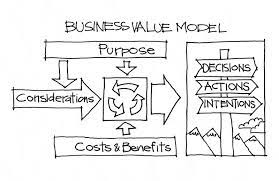The Incremental Model of Decision Making
Decision making is a complex process that individuals and organizations engage in on a daily basis. One approach to decision making is the incremental model, which involves making small adjustments to existing practices or decisions rather than starting from scratch.
In the incremental model, decisions are made based on past experiences and feedback, with changes being made gradually over time. This approach allows for flexibility and adaptability, as decisions can be adjusted as new information becomes available.
One of the key benefits of the incremental model is that it can help mitigate risk by allowing for small changes to be tested before committing to larger decisions. This can lead to more effective and efficient decision making processes.
However, critics of the incremental model argue that it may lead to missed opportunities for innovation and change, as it relies on making small adjustments rather than exploring entirely new options.
Overall, the incremental model of decision making can be a valuable tool for individuals and organizations looking to make informed choices while minimizing risk. By incorporating feedback and making gradual adjustments, decision makers can navigate complex situations with greater confidence and success.
7 Advantages of the Incremental Decision-Making Model: Flexibility, Risk Mitigation, and Continuous Improvement
- Allows for flexibility and adaptability in decision making.
- Mitigates risk by making small adjustments that can be tested before committing to larger decisions.
- Incorporates past experiences and feedback into the decision-making process.
- Helps in avoiding drastic changes that may disrupt existing practices.
- Facilitates a smoother transition when implementing changes over time.
- Encourages continuous improvement through incremental adjustments.
- Reduces the likelihood of costly mistakes by allowing for gradual modifications.
Challenges of the Incremental Decision-Making Model: Innovation, Change, and Adaptability
- May lead to missed opportunities for innovation and creativity
- Can result in slow progress or lack of significant change
- May create resistance to change within the organization
- Could overlook potential risks or challenges by focusing on incremental adjustments
- Might hinder the exploration of new solutions and approaches
- Can be less effective in rapidly changing or highly competitive environments
Allows for flexibility and adaptability in decision making.
The incremental model of decision making offers a significant advantage by allowing for flexibility and adaptability in the decision-making process. This approach enables individuals and organizations to make small adjustments based on feedback and changing circumstances, leading to more agile and responsive decision-making strategies. By embracing flexibility, decision makers can better navigate uncertainties and complexities, ensuring that decisions remain relevant and effective in dynamic environments.
Mitigates risk by making small adjustments that can be tested before committing to larger decisions.
One of the key advantages of the incremental model of decision making is its ability to mitigate risk by allowing for small adjustments to be tested before committing to larger decisions. This approach provides a safety net for decision makers, as they can assess the impact of minor changes and make informed choices based on real-world feedback. By taking incremental steps, individuals and organizations can minimize the potential negative consequences of a decision while gaining valuable insights that can guide them towards more successful outcomes in the long run.
Incorporates past experiences and feedback into the decision-making process.
One of the key advantages of the incremental model of decision making is its ability to incorporate past experiences and feedback into the decision-making process. By building upon existing knowledge and insights gained from previous decisions, individuals and organizations can make more informed choices. This approach allows for a deeper understanding of what has worked well in the past and what adjustments may be needed for future decisions, leading to more effective and strategic outcomes. By leveraging past experiences and feedback, decision makers can enhance their decision-making processes and increase the likelihood of achieving successful results.
Helps in avoiding drastic changes that may disrupt existing practices.
One of the key advantages of the incremental model of decision making is its ability to help in avoiding drastic changes that may disrupt existing practices. By making small adjustments over time, organizations can adapt to new information and feedback without completely overhauling their current processes. This gradual approach allows for a smoother transition and minimizes the risk of causing disruptions or chaos within the organization. Incremental decision making enables businesses to maintain stability while still making necessary improvements, ultimately leading to more sustainable and effective outcomes in the long run.
Facilitates a smoother transition when implementing changes over time.
The incremental model of decision making offers the advantage of facilitating a smoother transition when implementing changes over time. By making small adjustments gradually, organizations can adapt to new strategies or practices with minimal disruption. This approach allows for a more seamless integration of changes, as stakeholders have the opportunity to adjust and acclimate to new processes incrementally. As a result, the incremental model can help ensure a more successful implementation of changes while minimizing resistance and maximizing efficiency in the long run.
Encourages continuous improvement through incremental adjustments.
One of the key advantages of the incremental model of decision making is its ability to foster continuous improvement through small, incremental adjustments. By making gradual changes based on past experiences and feedback, individuals and organizations can fine-tune their strategies and processes over time. This iterative approach allows for constant refinement and optimization, leading to more effective decision making and long-term success.
Reduces the likelihood of costly mistakes by allowing for gradual modifications.
One significant advantage of the incremental model of decision making is its ability to reduce the likelihood of costly mistakes by enabling gradual modifications. By making small adjustments over time based on feedback and past experiences, decision makers can test the impact of changes before fully committing to them. This approach helps in identifying and rectifying potential errors early on, thereby minimizing the risk of making costly mistakes that could have significant negative consequences. The incremental model’s emphasis on gradual modifications provides a safety net that allows decision makers to navigate complex situations with greater caution and precision, ultimately leading to more informed and successful outcomes.
May lead to missed opportunities for innovation and creativity
One significant drawback of the incremental model of decision making is that it has the potential to stifle innovation and creativity. By focusing on making small adjustments to existing practices or decisions, there is a risk of overlooking entirely new and innovative solutions that could lead to significant advancements. This approach may limit the exploration of unconventional ideas and opportunities for groundbreaking change, ultimately hindering the organization’s ability to stay competitive and adapt to evolving market conditions.
Can result in slow progress or lack of significant change
One drawback of the incremental model of decision making is that it can result in slow progress or a lack of significant change. Because this approach focuses on making small adjustments to existing practices, it may not always lead to bold or innovative decisions that can drive substantial progress. In some cases, sticking to incremental changes may hinder the organization from adapting quickly to changing circumstances or seizing new opportunities for growth and improvement. As a result, relying solely on the incremental model may limit the ability to make transformative changes that could have a more significant impact in the long run.
May create resistance to change within the organization
One significant drawback of the incremental model of decision making is that it may create resistance to change within the organization. Since this approach focuses on making small adjustments to existing practices rather than embracing radical changes, employees and stakeholders may become complacent and resistant to adopting new ideas or strategies. This resistance can hinder innovation and limit the organization’s ability to adapt to evolving market conditions or opportunities for growth. Over time, this reluctance to change can lead to stagnation and hinder the organization’s long-term success.
Could overlook potential risks or challenges by focusing on incremental adjustments
One significant drawback of the incremental model of decision making is the potential to overlook potential risks or challenges by focusing on making small, incremental adjustments. By primarily focusing on gradual changes to existing practices, decision makers may fail to fully consider or address larger risks or challenges that require more radical solutions. This approach could lead to missed opportunities for innovation and growth, as well as leave organizations vulnerable to unforeseen consequences that could have been mitigated with a more comprehensive decision-making strategy.
Might hinder the exploration of new solutions and approaches
One significant drawback of the incremental model of decision making is that it has the potential to hinder the exploration of new solutions and approaches. By focusing on making small adjustments to existing practices, decision makers may become complacent and less inclined to seek out innovative or alternative strategies. This limitation can restrict the ability to think outside the box and may prevent individuals or organizations from fully exploring creative and potentially more effective solutions to complex problems.
Can be less effective in rapidly changing or highly competitive environments
In rapidly changing or highly competitive environments, the incremental model of decision making may be less effective due to its focus on making small adjustments based on past experiences. In such dynamic settings, where quick and bold decisions are often necessary to stay ahead of the competition, relying solely on incremental changes may lead to missed opportunities for innovation and proactive decision making. This limitation highlights the importance of considering alternative decision-making models that can better accommodate the fast-paced nature of these environments and foster agility and adaptability.




